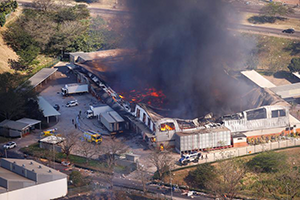
When I was in primary school, we had something that was constant, it happened as a regularity, but at irregular intervals – we had emergency drills, bomb drills, fire drills and emergency evacuation drills. From a very young age we were prepared for the ‘what if’, the exceptional circumstances that might happen.
How many of these emergency drills have you done in the last year? And how prepared are your workers and family if there is an emergency?
Recently we experienced disaster, chaos and many of us lost our livelihood. Many business premises and malls were burned to the ground or irreparably damaged. Yes, it is something we could not have foreseen (debatable though), but the fact is it is something we could have prepared for – but it was the exception.
What is an exception?
An exception is any deviation or occurrence not envisaged or planned for from the acceptable business process planning/strategy that an organisation has implemented. Exception-based demand management uses a forecasting process that also identifies anomalies in the forecast. You are then able to proactively make corrections before any damage is caused.
So how do we do demand planning when it comes to our facilities security and identify anomalies?
In most cases, security is one of our last agenda/strategy items and thoughts, it gets the short straw of the budget. When we cut costs, we do so by getting something ‘cheaper’, by cutting the security complement but not decreasing their workload – we expect the same level of security with fewer personnel and cheaper equipment.
So how far has our cheaper security brought us today? How much money did we save? How prepared were we for ‘the exception and/or anomaly’ when it comes to security at our premises?
Security operational measures for strategy and budget planning
These five steps are crucial when it comes to planning your security strategy and budget:
1. Identify your sensitive areas. Get a reputable security company to compile a risk analysis. This will be the data you need to focus your resources on, protecting and safeguarding your most valuable assets, facilities, personnel and data.
2. Identify possible threats. A reputable security company will have in-depth knowledge of your industry and location threats. This is an ongoing process of collecting and processing data and intelligence specifically relating to security and safety in your industry and location. While you should be wary of third parties trying to harm your premises, stock or personnel, you should also watch out for insider threats, such as negligent employees and disgruntled workers.
3. Continually analyse security vulnerabilities in correlation with your security service provider, involve a third-party for unbiased observation. Assess your current safeguards and determine any loopholes or existing weaknesses that may be exploited to gain access to your premises, products and employees. The security industry’s equipment and operating procedures change continuously, make sure your security company is up-to-date with the newest technologies and methods and stay informed.
4. Consistently appraise the level of risk associated with each vulnerability at your facility or premises. In correlation with your security service provider, rank your vulnerabilities using factors such as the likelihood of an attack happening (internal and external sources), the extent of damage that you would suffer in event of such an occurrence and the amount of capital, work and time you would need to recover. The more likely and damaging an attack is, the more you should prioritise mitigating the associated risk related to the damage; this is an important measure in planning your security budget, does the threat outweigh the expenditure?
5. Put countermeasures in place. The last step of operational security strategy is to create and implement a plan to eliminate threats and mitigate risks. This could include regular security and safety drills, training employees on sound security practices and company policies. Countermeasures should be straightforward and simple. Employees should be able to understand the implemented measures required on their part with or without additional training.
Preparation and strategy can be learned
The advantage of preparation is that you can manage situations quickly and more efficiently because you will already have the solutions and plans at hand ready to be implemented. The important factor here is obtaining the services of a reputable security company that plays an integral part in your day-to-day operations and has a vested interest in your company’s success and the safety of your premises, goods and personnel.

Being prepared can reduce fear, anxiety and losses that accompany any threat, attack or theft. We can reduce the impact of and sometimes avoid, the possible dangers completely.
Preparation is as important as planning and strategy, maybe even more so. Preparation gets you ready to do the work collectively with all role players and service providers. You could say that operational security strategy and planning is the original step and preparation is the sequel. The truth is, you can plan all you want, but if you do not prepare continuously no one will be ready in the eventuality that your business is attacked either from internal or from external threats.

© Technews Publishing (Pty) Ltd. | All Rights Reserved.